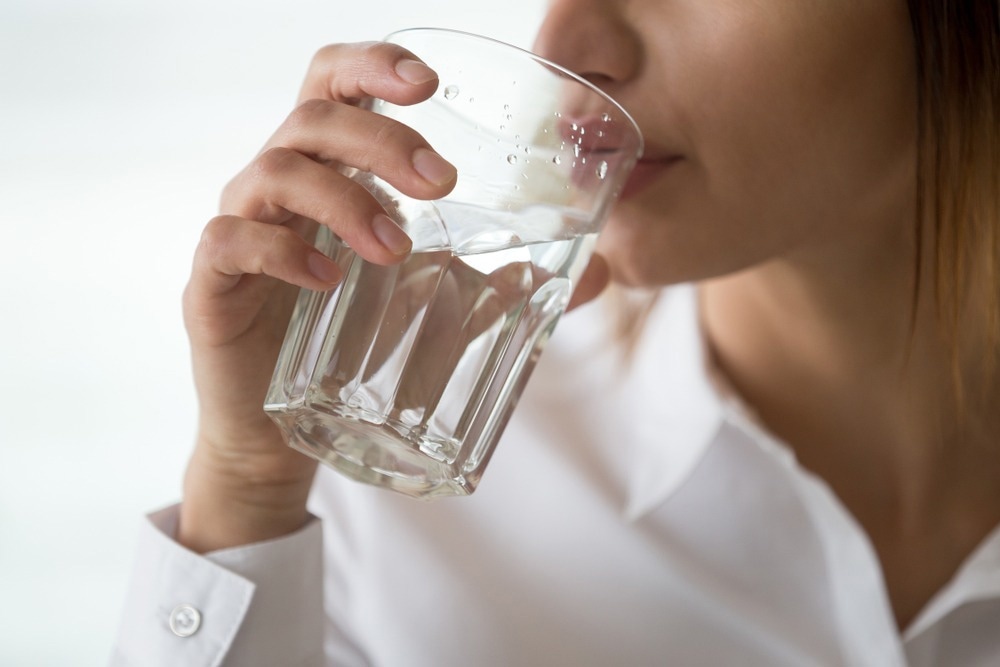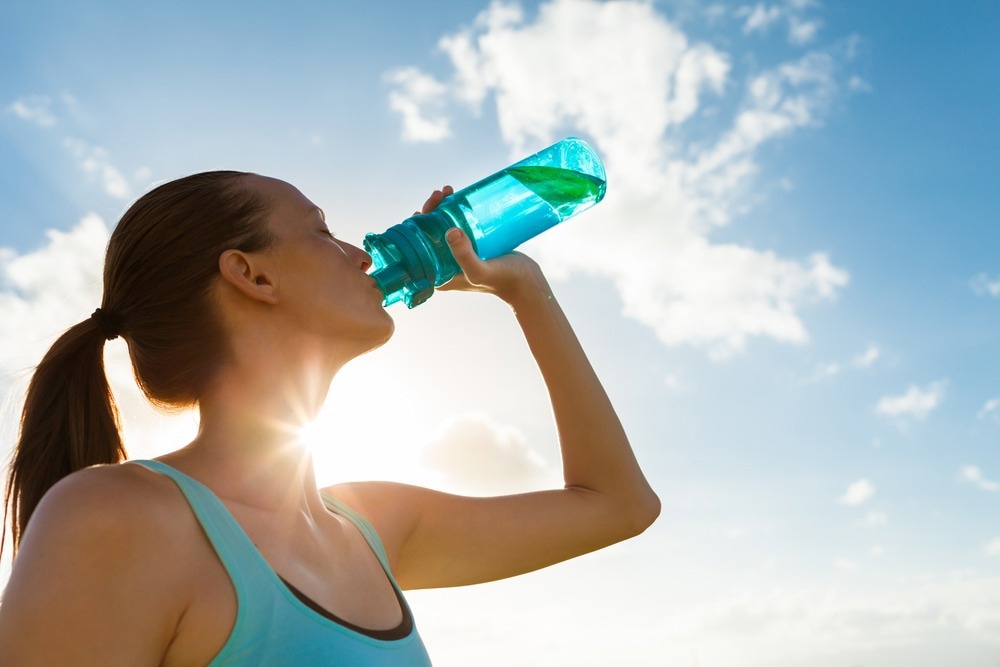The importance of hydration
The science of hydration
Daily water intake: How much is enough?
The role of water in disease prevention and management
Hydration tips for everyday life
Understanding different hydration sources
Conclusion
References
Further reading
Water, an essential nutrient, is fundamental for life and plays a vital role in regulating several physiological functions in the human body. This article explores the importance of water and hydration on your health and wellbeing.
 Dehydrated woman feeling thirsty holding glass drinking filtered pure mineral fresh water for body refreshment or energy recovery, dehydration problem, hydration and health concept, close up view. Image Credit: fizkes/Shutterstock.com
Dehydrated woman feeling thirsty holding glass drinking filtered pure mineral fresh water for body refreshment or energy recovery, dehydration problem, hydration and health concept, close up view. Image Credit: fizkes/Shutterstock.com
The importance of hydration
Water serves as a building block in all of our body's cells as well as in the many tissues and compartments. Due to its high heat capacity, water aids in thermoregulation by reducing body temperature fluctuations in warm or cold environments1. It acts as a carrier in the human body and aids in the transportation of nutrients to the cells. 2
Other important functions regulated by water include the removal of waste from the body2 and regulation of blood circulation3. It also facilitates the exchange between ions, capillaries, and blood vessels. 3
There are three main sources of water inputs. First, the water that we drink is made up of water and other liquids that have a high water content—85 to >90%. Next is the water we consume from a variety of meals that range in water content from 40 to >80%. Finally, the oxidation of macronutrients yields the water that we make.4
Dehydration can lead to acute disorders like heatstroke, but it can also raise the risk of chronic kidney disease, kidney stones, urinary tract infections, metabolic diseases, and cardiovascular diseases5. Dehydration-related body mass losses of more than 2% are often linked to increased tiredness and decreased attention6.
The science of hydration
Healthy people who maintain their water balance are in a normal hydration state. Being able to determine the level of hydration in people who are exposed to environmental factors that can cause dehydration is practically crucial. 7
Hydration plays several important roles, particularly for neurological function (such as mood and cognitive function), gastrointestinal and renal function, body weight and composition, and skin health. An increasing amount of research is showing how crucial staying well hydrated is to preserving good health, particularly in terms of weight control, kidney stone risk, and cognitive function8.
Daily water intake: How much is enough?
Since water makes up around 60% of our total weight, it is the primary component of our body. The water content of the body changes with its makeup. Compared to adults, water makes up a larger portion of the body weight in newborns and children. 8
The amount of water required is defined by empirically derived intake levels that are predicted to meet the nutritional demands of a healthy population. This is the amount of water that is considered adequate for newborns, adolescents, adults, and older people. 4
The Food and Nutrition Board of 2004 established values for a sufficient intake of water from liquids. 0.7 liters per day for babies ages 0–6 months, 0.6 liters per day for babies ages 7–12 months, 0.9 liters per day for kids ages 1-3, and 1.2 liters per day for kids ages 4–84. For male teenagers ages 9 to 13, 14 to 18, and adult males, the requirement of water is 1.8, 2.6, and 3.0 liters of water per day. Female teenagers between the ages of 9 and 13 require 1.6 liters per day, 14 to 18 require 1.8 liters per day, and adult females require 2.2 liters per day. 4
Healthy humans precisely control their daily water balance despite having different water needs. On the other hand, dehydration poses a bigger risk to older individuals and newborns than to adults. In addition to encouraging those who are at risk of dehydration to drink more water, parents and other caregivers should be aware of the symptoms of dehydration in young children and older adults. 4
According to the National Council of Aging, some common myths related to water consumption are that drinking liquids is the only way to stay hydrated, everyone should drink eight glasses of water per day, one cannot drink too much water, and if a person is not thirsty, then they are not dehydrated. 9 These are common misconceptions because it is possible to overindulge in water and consume more than your body can process, which can result in a condition known as hyponatremia or water poisoning.

Young female drinking a bottle of water. Image Credit: KieferPix/Shutterstock.com
Additionally, thirst is not always a reliable indicator of proper hydration. Cucumbers, celery, strawberries, and watermelon are fruits that increase fluid intake, as do dishes like soups, broths, and stews. 9
The role of water in disease prevention and management
Water is essential to almost every biological process. Therefore, it's critical for health to make sure the body gets enough water to sustain normal function. According to a study, drinking water can enhance mood and visual attention, whereas experiencing extreme hypohydration has been proven to impact short-term memory and visual perception negatively. 10
Headaches are believed to be caused by hypohydration, and some types of headaches may be relieved by drinking more fluids. 8 In addition to exhaustion, hypohydration is linked to an increase in negative emotions like stress, wrath, and hostility. Independent of changes in caloric intake, increased water consumption helps obese persons lose weight and/or reduce body fat. 8
Guidelines suggesting increasing fluid intake as a preventive measure against kidney stones were developed as a result of observational research showing a correlation between low total fluid consumption and high risk for kidney stones. 11 There is a decrease in stool weight and frequency as well as an increase in the likelihood of constipation during times of fluid restriction. Bowel function was restored to normal with the resumed regular consumption of fluids. 12
Hydration tips for everyday life
Getting adequate fluids each day is the best defense against dehydration. According to NIH, water or other low-calorie drinks, like plain coffee or tea, effervescent or flavored waters, can be ideal sources of fluids. Nutritious drinks like pure vegetable juice or milk or its substitutes are also excellent choices.
Drinking more is advised when exercising or being active in hot weather because these activities cause increased sweating. However, doctors normally advise women to drink approximately 9 cups of fluid each day and males approximately 13 cups.
Urinating more frequently can be caused by some illnesses, such as diabetes or chronic renal disease, as well as some medications. As a result, individuals suffering from these conditions should focus on consuming more water. 13
Understanding different hydration sources
The European Hydration Institute has documented a plethora of hydration sources that can be consumed regularly. Non-alcoholic beverages like tea, coffee, sports drinks, soft drinks, and lemonade comprise water content of up to 90% to 100%. Alcoholic beverages like beer and wine and soups like mushroom cream and noodles with chicken include a water content of 80% to 95%. Dairy products like whole milk, yogurt, ice cream, and cheese have a water intake of 87-90%, 75-85%, 60-65%, and 40-60%, respectively. 14
Conclusion
With an understanding of the mechanisms governing the water balance and the key physiological activities of water, a sedentary adult should drink 1.5 liters of water per day on average. This can ensure that the body stays hydrated and functions correctly. 4
Deficits in body water can have an impact on function and health and make it more difficult to maintain homeostasis under perturbations like illness and physical activity8. Water is essential to almost every biological process. Therefore, it's critical for health to make sure the body gets enough water to sustain normal function.
References
- Montain, S. J., Latzka, W. A., & Sawka, M. N. (1999). Fluid replacement recommendations for training in hot weather. Military medicine, 164(7), 502–508.
- Häussinger D. (1996). The role of cellular hydration in the regulation of cell function. The Biochemical journal, 313 ( Pt 3)(Pt 3), 697–710. https://doi.org/10.1042/bj3130697
- Grandjean, A., & Campbell, S. M. (2004). Hydration: fluids for life. ILSI North America.
- Jéquier, E., & Constant, F. (2010). Water as an essential nutrient: the physiological basis of hydration. European journal of clinical nutrition, 64(2), 115–123. https://doi.org/10.1038/ejcn.2009.111
- Cotter, J. D., Thornton, S. N., Lee, J. K., & Laursen, P. B. (2014). Are we being drowned in hydration advice? Thirsty for more?. Extreme physiology & medicine, 3, 18. https://doi.org/10.1186/2046-7648-3-18
- Benton, D., & Young, H. A. (2015). Do small differences in hydration status affect mood and mental performance?. Nutrition reviews, 73 Suppl 2, 83–96. https://doi.org/10.1093/nutrit/nuv045
- Armstrong, L. E., Soto, J. A., Hacker, F. T., Jr, Casa, D. J., Kavouras, S. A., & Maresh, C. M. (1998). Urinary indices during dehydration, exercise, and rehydration. International journal of sport nutrition, 8(4), 345–355. https://doi.org/10.1123/ijsn.8.4.345
- Liska, D., Mah, E., Brisbois, T., Barrios, P. L., Baker, L. B., & Spriet, L. L. (2019). Narrative Review of Hydration and Selected Health Outcomes in the General Population. Nutrients, 11(1), 70. https://doi.org/10.3390/nu11010070
- The Truth About Hydration: 7 Myths and Facts. [Online]. Available from: https://www.ncoa.org/article/the-truth-about-hydration-7-myths-and-facts
- Masento, N. A., Golightly, M., Field, D. T., Butler, L. T., & van Reekum, C. M. (2014). Effects of hydration status on cognitive performance and mood. The British journal of nutrition, 111(10), 1841–1852. https://doi.org/10.1017/S0007114513004455
- Dion, M., Ankawi, G., Chew, B., Paterson, R., Sultan, N., Hoddinott, P., & Razvi, H. (2016). CUA guideline on the evaluation and medical management of the kidney stone patient - 2016 update. Canadian Urological Association journal = Journal de l'Association des urologues du Canada, 10(11-12), E347–E358. https://doi.org/10.5489/cuaj.4218
- Klauser, A. G., Beck, A., Schindlbeck, N. E., & Müller-Lissner, S. A. (1990). Low fluid intake lowers stool output in healthy male volunteers. Zeitschrift fur Gastroenterologie, 28(11), 606–609.
- Hydrating for Health. [Online]. Available from: https://newsinhealth.nih.gov/2023/05/hydrating-health
- Water content in common foods and beverages. [Online]. Available from: https://www.europeanhydrationinstitute.org/nutrition_and_beverages/
Further Reading
Last Updated: Feb 12, 2024